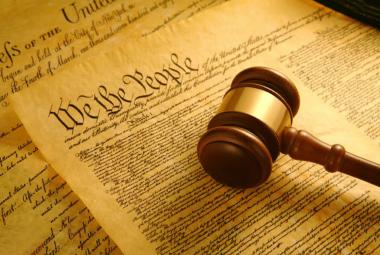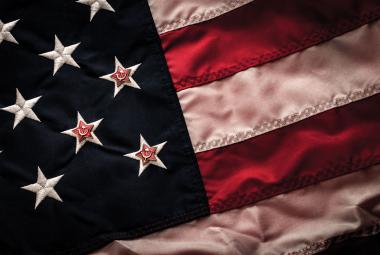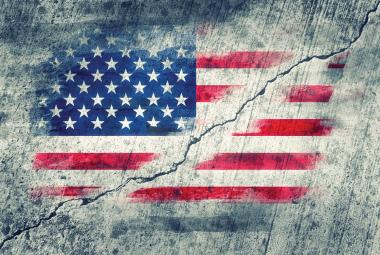The American nation was built on the vast farmlands that stretch from the Alleghenies to the Rockies, and it was that farmland which produced the wealth that funded American industrialization. It was through the efforts of the American farmers who, amazingly, could produce more than they could consume and then sold their excess crops in the east and in Europe. It was their savings that provided the founding capital of American industry.
But it was not just the extraordinary land or the farmers and ranchers who alone set this process in motion. Rather, it was also the geography - the extraordinary system of rivers that flowed through the Midwest and allowed them to ship their surplus to the rest of the world. All the rivers flowed into one - the Mississippi - and the Mississippi flowed to the ports in and around one city: New Orleans.
It was in New Orleans that the barges were unloaded and their cargos stored, sold, and reloaded onto ocean-going vessels. Until Hurricane Katrina, New Orleans was, in many ways, the pivot of the American economy.
For that reason, the Battle of New Orleans in January 1815 was a key moment in American history. Even though the battle occurred after the War of 1812 was over, had the British taken New Orleans, we suspect they wouldn't have given it back. Without New Orleans, the entire Louisiana Purchase would have been almost valueless to the United States. The value of the Purchase was the land and the rivers - which all converged on the Mississippi and the ultimate port of New Orleans.
Even during the Cold War, strategic studies on the vulnerability of the U.S. raised a macabre issue: If the Soviets could destroy one city with a large nuclear device, which would it be? In addition to the usual answers of Washington or New York, an insightful, enticing alternative was New Orleans: If the Mississippi River was shut to traffic, then the foundations of the economy would be shattered. The industrial minerals needed in the factories wouldn't come in, and the agricultural wealth of the heartland couldn't flow out. Alternative routes really weren't available.
The Germans knew it too: a U-boat campaign occurred near the mouth of the Mississippi during World War II.
Katrina took out New Orleans almost as surely as a nuclear strike. Its geopolitical effect was not, in many ways, distinguishable from a mushroom cloud. The key exit from North America is now closed. The petrochemical industry, which has become an added value to the region, is now at risk. The navigability of the Mississippi south of New Orleans is a question mark. The Ports of South Louisiana and New Orleans, which run north and south of the city, are as important today as at any point during the history of the republic. On its own merit, POSL is the largest port in the United States by tonnage and the fifth-largest in the world. It exports more than 52 million tons a year, of which more than half are agricultural products: corn, soybeans and so on. A large proportion of U.S. agriculture flows out of the port. And we are now heading into the harvest time!
Furthermore, almost as much cargo, nearly 17 million tons, comes in through the port - including not only crude oil, but chemicals and fertilizers, coal, concrete, etc. The commodity chain of the global food industry starts here, as does that of American industry. If these facilities are gone, more than simply the price of goods shifts: The very physical structure of the global economy will have to be reshaped.
There are no good shipping alternatives. River transport is cheap, and most of the commodities we are discussing have low value-to-weight ratios. The U.S. transport system was built on the assumption that these commodities would travel to and from New Orleans by barge, where they would be loaded onto ships or offloaded. Apart from inadequate port capacity elsewhere in the United States, there aren't enough trucks or rail cars to handle the long-distance hauling of these enormous quantities - assuming for the moment that the economics could somehow be managed, which they cant be.
The focus in the media has been on the oil industry in Louisiana and Mississippi. This is certainly not a trivial question, but in a certain sense, it is dwarfed by the shipping issue. First, Louisiana is the source of about 15 percent of U.S.-produced petroleum, much of it from the Gulf. The local refineries are critical to American infrastructure. Were all of these facilities to be lost, the effect on the price of oil worldwide would be extraordinarily painful. If the river itself became unnavigable or if the ports are no longer functioning, however, the impact to the wider economy would be significantly more severe. In a sense, there is more flexibility in oil than in the physical transport of these other commodities.
The primary crisis, however, is not about the facilities, and it is not about the oil. It is about the loss of the city's population. The displacement of the population is the primary national crisis because the largest port in the United States cannot function without a city around it. The physical and business processes of a port cannot occur in a ghost town, and right now, that is what New Orleans is. Katrina has taken out the port - not just by destroying the facilities, but by rendering the area uninhabited and potentially uninhabitable. That means that even if the Mississippi remains navigable, the absence of a port near the mouth of the river makes the Mississippi enormously less useful than it was. For these reasons, the United States has lost not only its biggest port complex, but also the utility of its river transport system - the foundation of the entire American transport system. There are some substitutes, but none with sufficient capacity to solve the problem.
The impact of Katrina will be felt by each us, and in ways we cannot yet fully realize. The impact of the Gaza withdrawal will also be felt throughout Israel in ways we cannot yet fully realize. They, too, will feel the impacts far beyond the loss of the homes of those displaced. Our serious prayers need to continue for all those families affected by both. And for our leadership that they, too, will have the discernment and resolve for the trying times that clearly lie ahead for all of us.
We are indebted to Dr. George Friedman's article, New Orleans: A Geopolitical Prize, for suggesting these insights.






